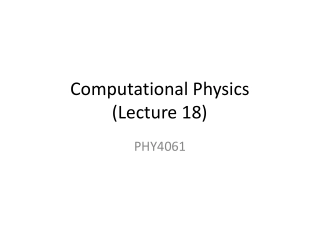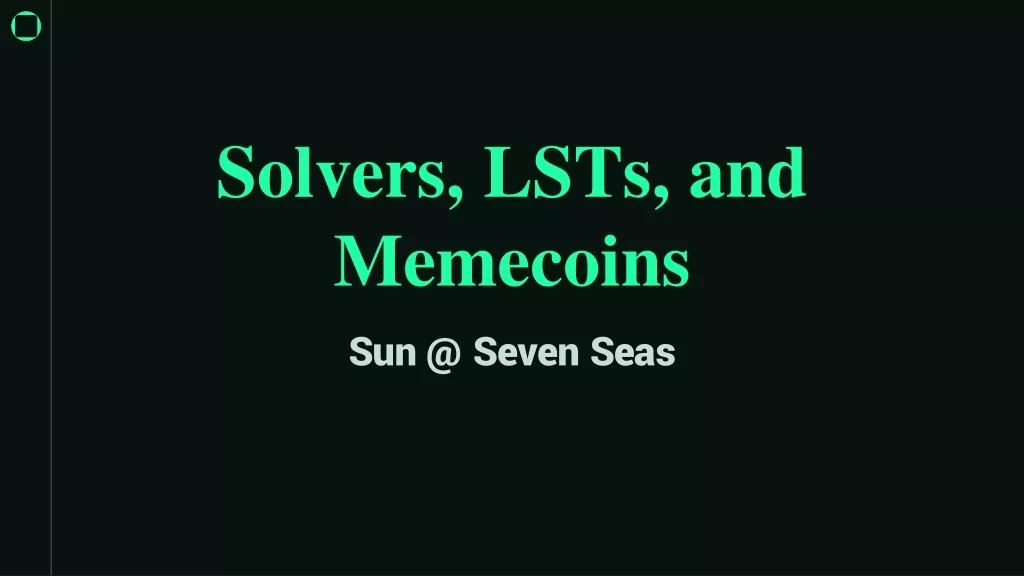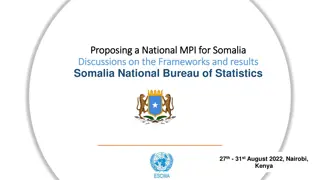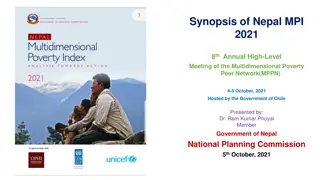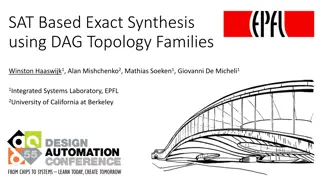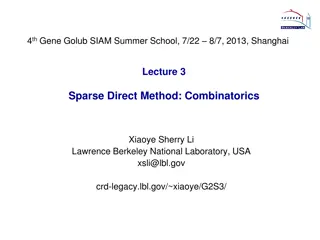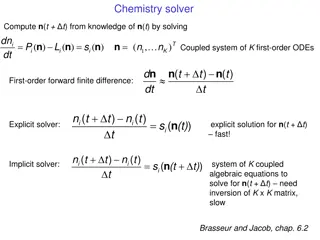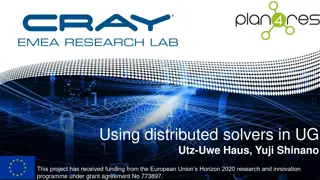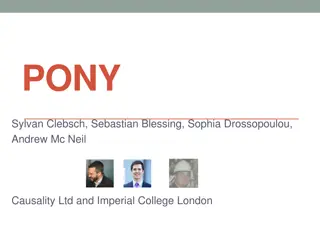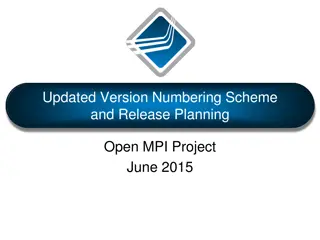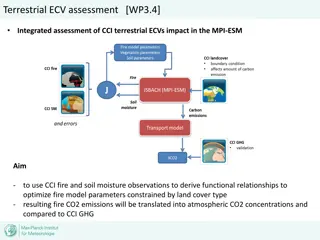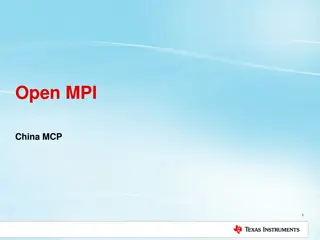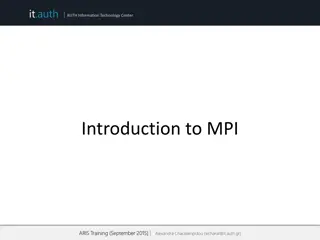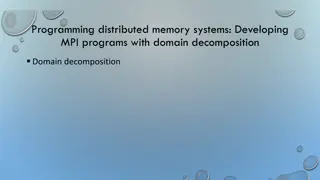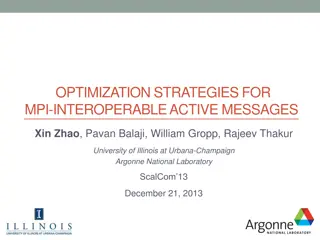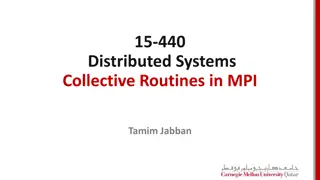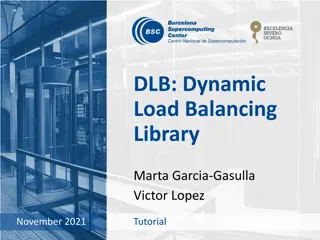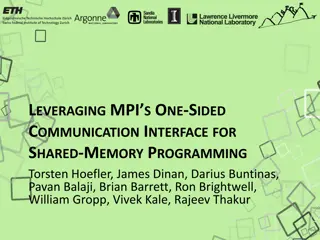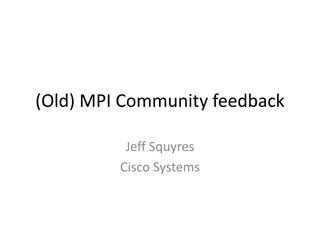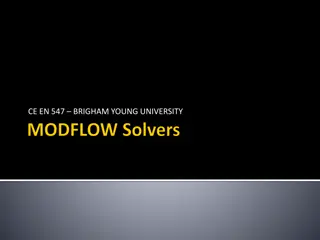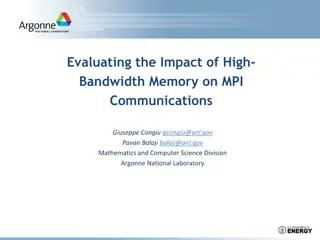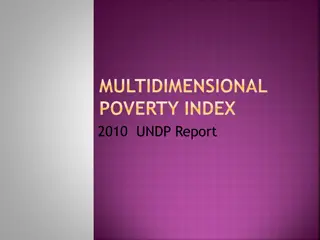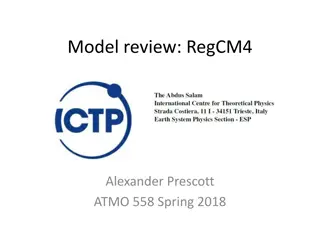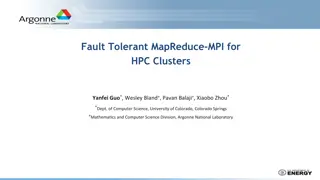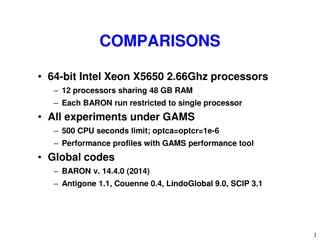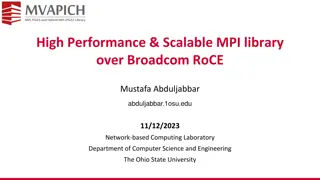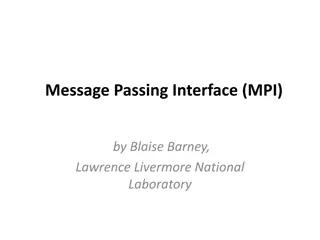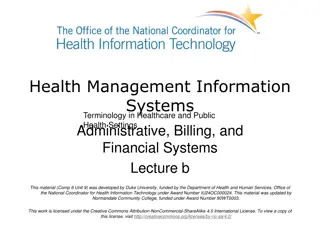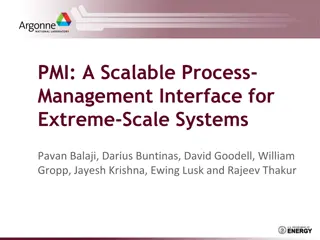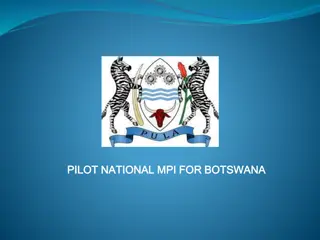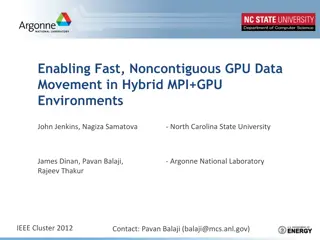Computational Physics (Lecture 18)
The basic structure of MPICH and its features in Computational Physics Lecture 18. Understand how MPI functions are used and linked with a static library provided by the software package. Explore how P4 offers functionality and supports parallel computer systems. Discover the concept of clusters in
0 views • 38 slides
Solvers and Memecoins in the Seven Seas Ecosystem
Explore the role of solvers, LSTs, and memecoins in the Seven Seas ecosystem, where strategists develop smart contracts and innovative strategies to enhance user experience and optimize trading processes. Learn about the Sommelier architecture and the significance of CEX-DEX arbitrage in the crypto
1 views • 14 slides
Enhancing Healthcare Services in Malawi through the Master Patient Index (MPI)
The Master Patient Index (MPI) plays a crucial role in Malawi's healthcare system by providing a national patient identification system to improve healthcare quality and treatment accuracy. Leveraging the MPI aims to dispense unique patient IDs, connect with existing registries, enhance data managem
4 views • 8 slides
Crash Course in Supercomputing: Understanding Parallelism and MPI Concepts
Delve into the world of supercomputing with a crash course covering parallelism, MPI, OpenMP, and hybrid programming. Learn about dividing tasks for efficient execution, exploring parallelization strategies, and the benefits of working smarter, not harder. Discover how everyday activities, such as p
0 views • 157 slides
Proposal for National MPI using SHDS Data in Somalia
The proposal discusses the creation of a National Multidimensional Poverty Index (MPI) for Somalia using data from the Somali Health and Demographic Survey (SHDS). The SHDS, with a sample size of 16,360 households, aims to provide insights into the health and demographic characteristics of the Somal
1 views • 26 slides
Overview of Nepal MPI 2021 and Multidimensional Poverty Peer Network Meeting
The 8th Annual High-Level Meeting of the Multidimensional Poverty Peer Network (MPPN) was hosted by the Government of Chile on 4-5 October, 2021. Dr. Ram Kumar Phuyal from the Government of Nepal National Planning Commission presented at the event. The meeting discussed poverty, its measurement tech
1 views • 20 slides
Comprehensive Overview of Numerical Linear Algebra Methods for Solving Linear Systems
Explore numerical linear algebra techniques for solving linear systems of equations, including direct and iterative methods. Delve into topics like Gaussian elimination, LU factorization, band solvers, sparse solvers, iterative techniques, and more. Gain insights into basic iterative methods, error
6 views • 12 slides
Enhancing Academic Proficiency and Workplace Competencies in Secondary School Learners through Consumer Studies Assessment
In South Africa, the National Senior Certificate (NSC) and the Independent Examinations Board (IEB) play crucial roles in assessing learners' academic proficiency and workplace competencies. Consumer Studies, as an elective subject, is integral in developing responsible consumer behavior and equippi
1 views • 23 slides
Exploring the Role of Engineers as Problem Solvers in Society
Engineers play a vital role in solving complex problems and shaping the future. They are creative problem-solvers who have the potential to make significant contributions to various industries. Engineering offers not only job security and financial stability but also the opportunity to work with tal
0 views • 10 slides
SAT-Based Exact Synthesis Using DAG Topology Families
Explore the world of exact synthesis in digital circuit design utilizing SAT solvers to achieve precise results. Understand the challenges, decision problems, algorithms, motivation behind exact synthesis, and the contribution of SAT solvers in mitigating runtime. Discover the concept of DAG topolog
0 views • 17 slides
Overview of Sparse Linear Solvers and Gaussian Elimination
Exploring Sparse Linear Solvers and Gaussian Elimination methods in solving systems of linear equations, emphasizing strategies, numerical stability considerations, and the unique approach of Sparse Gaussian Elimination. Topics include iterative and direct methods, factorization, matrix-vector multi
0 views • 35 slides
A Handbook for Building National MPIs: Practical Guidance for Ending Poverty
This handbook provides detailed practical guidance on creating a technically rigorous permanent national Multidimensional Poverty Index (MPI). Jointly developed with UNDP, it aims to accelerate progress towards the Sustainable Development Goals by offering insights from countries' experiences in des
3 views • 18 slides
Learning Styles: Honey and Mumford Based on Kolb's Work
Explore the four learning styles proposed by Honey and Mumford, which are based on the work of Kolb. The four styles are Activists, Reflectors, Theorists, and Pragmatists. Each style is characterized by unique traits and preferences for learning methods. Activists thrive on new experiences and chall
0 views • 10 slides
Chemical Kinetics and Numerical Solvers in Chemistry
Explore the principles of chemical kinetics and the use of numerical solvers to compute concentrations over time, considering explicit and implicit methods. Understand stability and positivity requirements in solvers and the importance of characteristic time scales in chemical systems. Dive into a s
0 views • 5 slides
Distributed Solvers for Scalable Computing in UG
This project discusses the use of distributed solvers in UG to enable multi-rank MPI-based solvers with varying sizes, addressing the need for scalable solver codes and dynamic resource allocation. It introduces the UG solver interface, revisits the Concorde solver for TSP problems, and explores run
0 views • 14 slides
A Deep Dive into the Pony Programming Language's Concurrency Model
The Pony programming language is designed for high-performance concurrent programming, boasting speed, ease of learning and use, data race prevention, and atomicity. It outperforms heavily optimized MPI versions in benchmarks related to random memory updates and actor creation. With an API adopted f
0 views • 33 slides
Open MPI Project: Updated Version Numbering Scheme & Release Planning
Explore the transition from an odd/even version numbering scheme to an A.B.C version triple for Open MPI project, addressing issues with feature adoption and stability. This update aims to deliver new features efficiently and maintain backward compatibility effectively.
0 views • 36 slides
Integrated Assessment of Terrestrial ECV Impact in MPI-ESM
Utilizing CCI fire and soil moisture observations to optimize fire model parameters in MPI-ESM. The study focuses on deriving functional relationships to enhance accuracy in predicting fire CO2 emissions and their impact on atmospheric CO2 concentrations compared to CCI GHG data. JSBACH-SPITFIRE fir
0 views • 7 slides
Open MPI: A Comprehensive Overview
Open MPI is a high-performance implementation of MPI, widely used in academic, research, and industry settings. This article delves into the architecture, implementation, and usage of Open MPI, providing insights into its features, goals, and practical applications. From a high-level view to detaile
0 views • 33 slides
Introduction to Message Passing Interface (MPI) in IT Center
Message Passing Interface (MPI) is a crucial aspect of Information Technology Center training, focusing on communication and data movement among processes. This training covers MPI features, types of communication, basic MPI calls, and more. With an emphasis on MPI's role in synchronization, data mo
0 views • 29 slides
Developing MPI Programs with Domain Decomposition
Domain decomposition is a parallelization method used for developing MPI programs by partitioning the domain into portions and assigning them to different processes. Three common ways of partitioning are block, cyclic, and block-cyclic, each with its own communication requirements. Considerations fo
1 views • 19 slides
Optimization Strategies for MPI-Interoperable Active Messages
The study delves into optimization strategies for MPI-interoperable active messages, focusing on data-intensive applications like graph algorithms and sequence assembly. It explores message passing models in MPI, past work on MPI-interoperable and generalized active messages, and how MPI-interoperab
0 views • 20 slides
Collective Communication in MPI Distributed Systems
Explore the importance of collective routines in MPI, learn about different patterns of collective communication like Scatter, Gather, Reduce, Allreduce, and more. Discover how these communication methods facilitate efficient data exchange among processes in a distributed system.
0 views • 6 slides
Dynamic Load Balancing Library Overview
Dynamic Load Balancing Library (DLB) is a tool designed to address imbalances in computational workloads by providing fine-grain load balancing, resource management, and performance measurement modules. With an integrated yet independent structure, DLB offers APIs for user-level interactions, job sc
0 views • 27 slides
Leveraging MPI's One-Sided Communication Interface for Shared Memory Programming
This content discusses the utilization of MPI's one-sided communication interface for shared memory programming, addressing the benefits of using multi- and manycore systems, challenges in programming shared memory efficiently, the differences between MPI and OS tools, MPI-3.0 one-sided memory model
1 views • 20 slides
Challenges and Feedback from 2009 Sonoma MPI Community Sessions
Collected feedback from major commercial MPI implementations in 2009 addressing challenges such as memory registration, inadequate support for fork(), and problematic connection setup scalability. Suggestions were made to improve APIs, enhance memory registration methods, and simplify connection man
0 views • 20 slides
Government Funding Options for Kiwifruit Growers in June 2021
Ministry for Primary Industries (MPI) provides various funding schemes and ongoing projects to support kiwifruit growers, including environmental schemes, Māori landowners' support programs, and Sustainable Food and Fibre Futures. These initiatives offer financial assistance, mediation for financia
0 views • 7 slides
Analysis of Branching Heuristics in SAT Solvers
This content delves into various branching heuristics used in SAT solvers, such as Exponential Recency Weighted Average, Conflict History-Based, and Tie-break of VSIDS. It discusses the decision-making processes of solvers and compares different approaches to handle ties and improve solver performan
0 views • 16 slides
Iterative Solvers in MODFLOW
In this content, you will learn about the working of iterative solvers, solver parameters, troubleshooting convergence issues, and various solver algorithms in MODFLOW. The iterative tweaking of starting head values, different solver codes like SIP, PCG2, GMG, and their characteristics are explained
0 views • 21 slides
Impact of High-Bandwidth Memory on MPI Communications
Exploring the impact of high-bandwidth memory on MPI communications, this study delves into the exacerbation of the memory wall problem at Exascale and the need to leverage new memory technologies. Topics covered include intranode communication in MPICH, Intel Knight Landing memory architecture, and
0 views • 20 slides
The Multidimensional Poverty Index (MPI)
The MPI, introduced in 2010 by OPHI and UNDP, offers a comprehensive view of poverty by considering various dimensions beyond just income. Unlike traditional measures, the MPI captures deprivations in fundamental services and human functioning. It addresses the limitations of monetary poverty measur
0 views • 56 slides
Overview of RegCM4 Model Features
RegCM4 is a community model developed since the 1980s, with over 800 scientists contributing to its advancements. It features a fully compressible, rotating frame of reference and a limited area dynamical core based on the Penn State/NCAR Mesoscale Model 5 (MM5). The model uses hydrostatic and nonhy
0 views • 14 slides
Fault-Tolerant MapReduce-MPI for HPC Clusters: Enhancing Fault Tolerance in High-Performance Computing
This research discusses the design and implementation of FT-MRMPI for HPC clusters, focusing on fault tolerance and reliability in MapReduce applications. It addresses challenges, presents the fault tolerance model, and highlights the differences in fault tolerance between MapReduce and MPI. The stu
2 views • 25 slides
Performance Comparison of Optimization Solvers on Intel Xeon X5650 Processors
Experiment results comparing the performance of optimization solvers (BARON, Antigone, LindoGlobal, SCIP, Couenne) on Intel Xeon X5650 2.66Ghz processors with 48GB RAM. The study includes 369 NLPs from various libraries and an aggregate analysis of 1740 NLPs and MINLPs. Performance profiles generate
0 views • 6 slides
Enhancing HPC Performance with Broadcom RoCE MPI Library
This project focuses on optimizing MPI communication operations using Broadcom RoCE technology for high-performance computing applications. It discusses the benefits of RoCE for HPC, the goal of highly optimized MPI for Broadcom RoCEv2, and the overview of the MVAPICH2 Project, a high-performance op
0 views • 27 slides
Message Passing Interface (MPI) Standardization
Message Passing Interface (MPI) standard is a specification guiding the development and use of message passing libraries for parallel programming. It focuses on practicality, portability, efficiency, and flexibility. MPI supports distributed memory, shared memory, and hybrid architectures, offering
0 views • 29 slides
Master Patient Index (MPI) in Healthcare Systems
Explore the significance of Master Patient Index (MPI) in healthcare settings, its role in patient management, patient identification, and linking electronic health records (EHRs). Learn about the purpose, functions, and benefits of MPI in ensuring accurate patient data and seamless healthcare opera
0 views • 16 slides
PMI: A Scalable Process Management Interface for Extreme-Scale Systems
PMI (Process-Management Interface) is a critical component for high-performance computing, enhancing scalability and performance. It allows independent development of parallel libraries like MPI, ensuring portability across different environments. The PMI system model includes various components suc
1 views • 29 slides
Insights into Pilot National MPI for Botswana
This document outlines the structure, dimensions, and indicators of the Pilot National Multidimensional Poverty Index (MPI) for Botswana. It provides detailed criteria for measuring deprivation in areas such as education, health, social inclusion, living standards, and more. The presentation also in
0 views • 10 slides
Fast Noncontiguous GPU Data Movement in Hybrid MPI+GPU Environments
This research focuses on enabling efficient and fast noncontiguous data movement between GPUs in hybrid MPI+GPU environments. The study explores techniques such as MPI-derived data types to facilitate noncontiguous message passing and improve communication performance in GPU-accelerated systems. By
0 views • 18 slides
